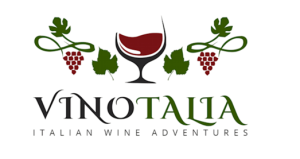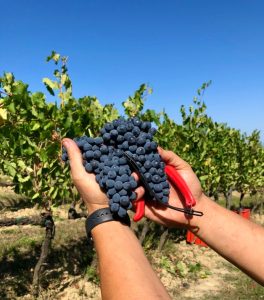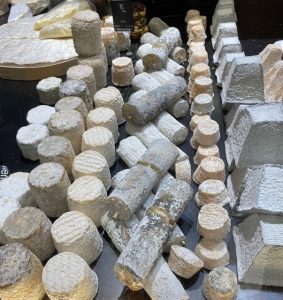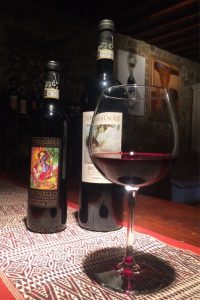
Buon Vino fa Buon Sangue
In Italy, there’s a saying that good wine makes good blood implying a connection between good health and the practice of drinking wine. Recent medical and scientific research seems to be bearing out what culture and tradition in the Bel Paese has shown for centuries. In years past, wine was an integral part of the daily sustenance for the contadini working long days in the fields and soldiers in ancient Rome were provided with a daily portion. In fact, where the centurions ventured, the vineyards quickly followed all over the Roman Empire.
The importance of wine in the diet has been realized since antiquity. Hippocrates, the Father of Western Medicine, advocated the use of wine to treat almost every illness he had studied:
“Wine is fit for man in a wonderful way, provided that it is taken with good sense by the sick as well as the healthy.”
Paracelsus, a German physician in the Middle Ages, and considered the Father of Pharmacology, invented the word alcohol and stressed the tonic value of wine:
“Whether wine is nourishment, medicine or poison, is a matter of dosage.”
So exactly what’s in that glass that can actually benefit our health?


Sangiovese grapes in the vineyard Le Chiuse, Montalcino
(Photos by author)
Fermentation in winemaking is the process that converts grape juice into an alcoholic beverage. During this process, yeasts transform the sugars in the juice to ethanol. When making red wine, the skins of the grapes are left in the must and it is these skins that contain remarkable and beneficial compounds – polyphenols. The National Institutes of Health define polyphenols as “antioxidants, antimutagens…and free radical scavengers”.
The most important polyphenols are anthocyanins, which give color to grapes; flavonoids, which help protect the plant from UV light, stress and diseases; and resveratrol, which provide antioxidant and antimicrobial properties to the plant. In people, these grape polyphenols appear to provide the same type of biological activities – antioxidant, anti-inflammation, anti-cancer, antiaging, cardio-protective and anti-microbial properties. What do these powerful grape components do?
A Healthier Heart
It appears that this ancient beverage dilates arteries and increases blood flow, perhaps lowering the risk of clots that could diminish blood supply and then damage heart muscles. By boosting the levels of HDL, it can improve high cholesterol and helps prevent LDL oxidation from damaging the lining of the arteries, according to the European Heart Journal, thereby helping to lower risk for heart attacks and strokes. Increased blood flow could produce better recovery for cardiac patients after strokes.
The Coperhagen Heart Study, involving 13,000 individuals, showed an inverse correlation between alcohol consumed and coronary mortality – only for wine drinkers! Moderate and regular wine consumption is one of the possible reasons for the low rates of coronary heart disease in France, despite the high intake of dietary cholesterol and saturated fat. Called the ”French paradox”, this circumstance increased interest in the scientific community in the relationship between wine consumption and cardiovascular health. Perhaps it’s no wonder the French can regularly dine on cheese yet have a lower risk than Brits or Americans!!

French cheese at the market in Lyon Photo by author
A Shield against Cancer
These same phenolic compounds that can work to lower the risks of heart disease can also slow the growth of cancer cells. According to studies by Greek and French scientists, resveratrol has been shown to suppress breast, prostate and liver cancer cells. Findings by a US dental school have indicated that resveratrol and quercetin may help to inhibit the growth of oral cancer cells due to their powerful antioxidant properties.
Many studies indicate that resveratrol could help prevent and treat certain types of cancer. Its anti-tumor effects include inhibiting cancer cell growth, cell signaling, angiogenesis (growth of new blood vessels and promoting tumor cell death. Resveratrol seems to negatively affects cancer at all stages of development and make chemotherapy more effective by blocking those proteins needed by cancer cells to make them chemotherapy-resistant.
Stronger Bones
Drinking red wine can help increase mineral bone density, thereby lowering the incidence of osteoporosis, especially in post-menopausal women. Studies indicate that women who drank a glass of red wine per day had greater bone density, as measured in the thighbone at the hip. Bone mineral density is used to determine bone strength and resilience. In the American Journal of Clinical Nutrition, a test of 500 elderly women indicated that bone density was 12-16% higher among moderate drinkers.
Resveratrol
Resveratrol is a key ingredient found in the skin of red grapes, a kind of “anti” boy wonder. From those unwanted wrinkles to arthritis and skin inflammation, it works to help protect the body from aging and disease as an anti-oxidant and anti-inflammatory. For diabetes, it is thought to modulate glucose levels and improve insulin resistance in addition to the cardiovascular benefits. Also, resveratrol has antibacterial and antifungal properties that help with infections of the urinary and digestive tracts.
Neuroinflammation, which affects the nervous system, is a big factor that contributes to the progression of brain-related diseases, such as dementia, Alzheimer’s and multiple sclerosis. In one study, a group of participants receiving a daily dose of resveratrol over a year, showed stabilization in neurological biomarkers while a control group receiving a placebo continued to decline, showing how effective it is at controlling inflammation, in the brain as well as the body. Resveratrol might have a protective effect by shielding cells from B-amyloid, which is a neurotoxin involved in the creation of plaque detected in neurodegenerative diseases.
Flavonoids
Flavonoids are another compound that is found in significant amounts in red wine, and evidence shows they will lower risks of many types of cancer. According to the National Institutes of Health: “Flavonoids have been shown to possess a wide variety of anticancer effects: they modulate…and suppress cancer cell proliferation and invasiveness.”
Disease prevention
Evidence in further studies is indicating that moderate drinking might be better for health than abstaining completely. Keep in mind that moderate is defined as one 5 ounce glass of red wine per day for a woman and two for a man. Drinking a glass or two of red wine with a meal could reduce a person’s chances of having a stroke, heart attack, bowel, lung and digestive cancer by 20-40%. Polyphenols are excellent antioxidants that can perform a wide variety of tasks, like controlling bacteria, promoting healthy intestinal environments and lowering blood pressure. They might very possibly increase cognitive function and longevity.
Creina Stockley, a manager at the Australian Wine Research Institute says, “People that drink a moderate amount of wine regularly, particularly with food, have a 30 per cent reduced risk of heart diseases. Phenolic compounds work by preventing the initiation, progression and growth of cancer cells… Drinking red wine appears to reduce or prevent the decrease in your ability to think, reason and remember. It may also reduce your risk of developing certain dementias such as Alzheimer’s.”
David Sinclair, professor and co-director of the Glenn Labs for Molecular Biological Aging at Harvard Medical School agrees: “We believe resveratrol protects from aging and disease.” One study followed 24,523 men and women between 20 and 98 years of age for a period of 11 years and reached the conclusion that moderate wine drinkers have a 20% lower all-cause mortality risk than non-wine drinkers. The US Department of Health and Human Services to recommend moderate alcohol consumption in its national health promotion and disease prevention initiative, Healthy People 2010.
 Brunello di Montalcino at Terralsole (Photo by author)
Brunello di Montalcino at Terralsole (Photo by author)
So perhaps when the Italians raise their glasses and offer the toast “Alla Salute” (to health), they really are onto something!
